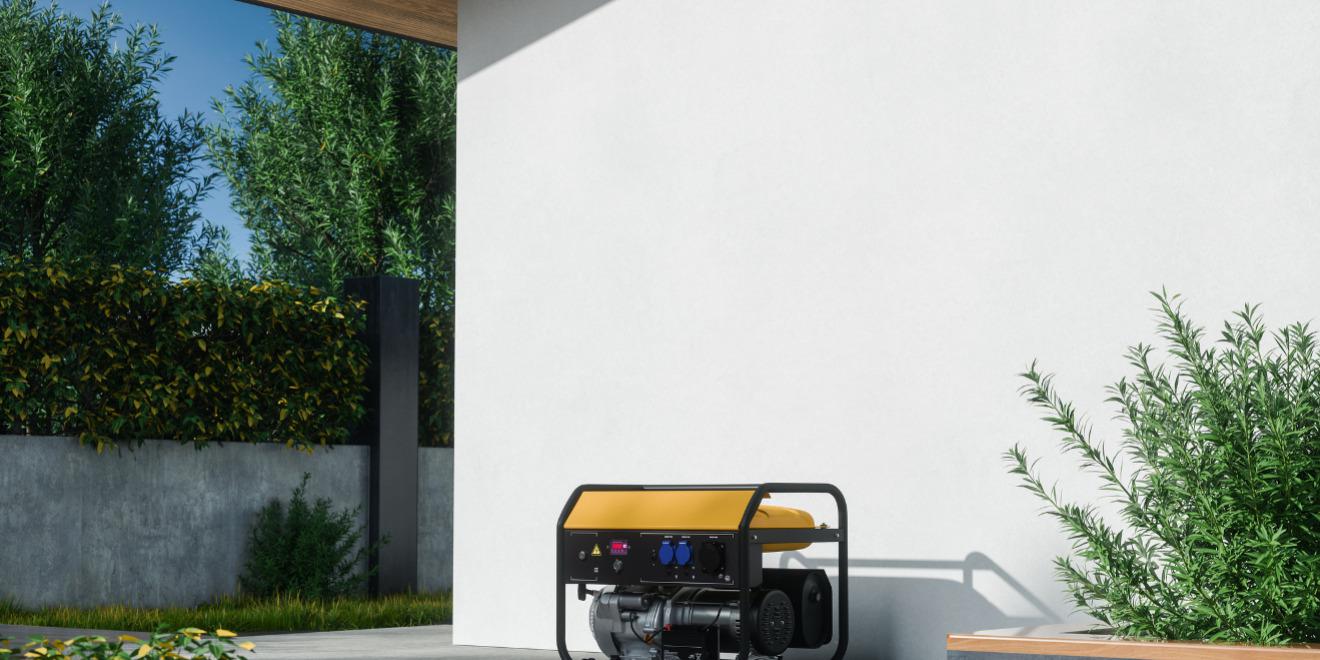Generators
Unless you live in a state besieged by inclement weather (like hurricanes or tropical storms), many homeowners take for granted that when the power is on it will stay on, no matter what. However, wherever you call home, your power is one bad storm, downed tree, or glitch in the grid away from leaving you in the dark.
Generators, both portable and standby, are the most relied upon power source when the electricity goes out. These versatile machines provide electricity when the main power grid fails, ensuring continuity and safety. When the power goes out, it doesn’t just mean no lights or TV, it means compromised security, medical equipment, medicine, and more.
Before you invest, take a look at what our experts have to say about what you should know about generators. Here’s what homeowners need to know about the workings of generators, the types, and how to choose the right one for their needs.
Understanding the Basics of Generators
How Does a Generator Work?
At its core, a generator converts mechanical energy into electrical energy. This process is based on the principle of electromagnetic induction, discovered by Michael Faraday in 1831. The generator creates electricity by moving an electrical conductor, typically a coil of wire, through a magnetic field.
The Core Components of a Generator
A typical generator consists of several key components:
- Engine: The primary source of mechanical energy
- Alternator: Converts mechanical energy into electrical energy
- Fuel System: Stores and supplies fuel to the engine
- Voltage Regulator: Controls and stabilizes the output voltage
- Cooling and Exhaust Systems: Manage heat and emissions
- Lubrication System: Reduces friction in moving parts
- Battery Charger: Keeps the starting battery charged
- Control Panel: Allows for monitoring and control of the generator
The Science Behind Electricity Generation
The process of generating electricity in a generator relies on Faraday's law of electromagnetic induction. When a conductor moves through a magnetic field, it induces an electrical current in the conductor. In a generator, this is achieved by rotating a coil of wire (the armature) within a stationary magnetic field (the stator), or vice versa, depending on the generator design.
How Do Generators Produce Electricity?
The Role of Fuel in Power Generation
Generators can use various types of fuel to produce electricity, including:
- Gasoline: Common in portable generators
- Diesel: Often used in larger standby generators
- Natural Gas: Popular for home standby generators
- Propane: Another option for home and portable generators
The fuel powers the engine, which provides the mechanical energy needed to turn the alternator and generate electricity.
The Conversion Process: Mechanical to Electrical Energy
The conversion process in a generator follows these steps:
- The engine burns fuel to create mechanical energy
- This energy turns the alternator's rotor
- The rotor spins a set of magnets around a coil
- This spinning creates a changing magnetic field
- The changing magnetic field induces an electric current in the coil
- The current is then channeled and regulated for use
Different Types of Generators
How Do Home Generators Work?
Home generators are designed to provide backup power during outages. They can be either portable or standby systems.
Portable Generator vs. Standby Generator
Portable generators are mobile units that can be moved and stored when not in use. They typically run on gasoline and require manual starting and connection to appliances or a transfer switch.
Taking Care of Your Portable Generator
Standby generators are permanent installations that automatically detect power outages and start providing electricity within seconds. They often run on natural gas or propane and can power an entire home.
The Importance of Automatic Transfer Switches
Automatic Transfer Switches (ATS) are crucial components in standby generator systems. They detect power outages, signal the generator to start, and safely switch the home's electrical system from utility power to generator power. This automation ensures a seamless transition during outages, protecting sensitive electronics and maintaining comfort and safety.
Choosing the Right Generator for Your Needs
What Size Generator Do I Need?
You may be convinced you need a generator – maybe you’ve wanted one for a while, but haven’t pulled the plug – but there are some need-to-know generator basics to consider to first.
Factors to Consider: Power Needs, Size, and Fuel Type
When choosing a generator, consider:
- Your total power requirements
- The size of your home
- The appliances and systems you need to power
- Available fuel types in your area
- Local regulations and noise restrictions
Sizing Guide: Small, Medium, and Large Homes
As a general guide:
- Small homes (up to 1,500 sq ft): 5,000 - 7,500 watts
- Medium homes (1,500 - 3,000 sq ft): 7,500 - 12,500 watts
- Large homes (over 3,000 sq ft): 12,500 - 20,000 watts or more
However, it's crucial to calculate your specific needs based on the appliances and systems you want to power during an outage.
Choose a Generator for Your Home
How Generators Work with Renewable Energy Sources
Integrating Solar Power with Your Generator
Integrating solar power with a generator can create a more sustainable and efficient backup power system. During daylight hours, solar panels can provide power and charge batteries. The generator can then take over when solar power is insufficient or unavailable, creating a hybrid system that reduces fuel consumption and emissions.
The Future of Hybrid Power Systems
Hybrid power systems combining generators with renewable energy sources like solar and wind are becoming increasingly popular. These systems offer improved efficiency, reduced environmental impact, and potentially lower operating costs. As battery technology improves, we can expect to see more sophisticated hybrid systems that seamlessly integrate multiple power sources.
Contact your local Mister Sparky to see if solar generators are an option for you.
Generator Services Near Me
Generator Installation
Professional generator installation ensures that your system is set up correctly, safely, and in compliance with local codes. This typically involves:
- Site assessment and preparation
- Proper placement of the generator
- Installation of the transfer switch
- Connecting fuel lines and electrical systems
- Testing and commissioning the system
Generator Repair and Maintenance
Regular maintenance is crucial for keeping your generator in top condition. This includes:
- Regular oil and filter changes
- Checking and replacing spark plugs
- Inspecting and cleaning fuel systems
- Testing batteries and electrical connections
- Checking for any signs of wear or damage
For expert generator services, including installation, maintenance, and repairs, contact Mister Sparky at (800) 906-4577 or visit our locations page to find a technician near you.
Frequently Asked Questions (FAQs)
How Often Should I Service My Generator?
Most manufacturers recommend servicing your generator at least once a year or after every 100 hours of use, whichever comes first. However, if you use your generator frequently or in harsh conditions, more frequent servicing may be necessary. Regular maintenance ensures reliability, extends the generator's lifespan, and maintains its efficiency.
Can I Run My Generator Continuously?
While some generators are designed for continuous operation, most residential generators are not meant to run indefinitely. Portable generators typically can run for 8-12 hours on a single tank of fuel. Standby generators can run for longer periods but still require regular breaks for maintenance and to prevent overheating. Always consult your generator's manual for specific guidelines on run times and required rest periods.
What Are the Signs My Generator Needs Repairs?
Common signs that your generator may need repairs include:
- Difficulty starting or frequent shutdowns
- Unusual noises or vibrations
- Visible leaks or damage
- Decreased power output
- Frequent circuit breaker trips
- Warning lights on the control panel
If you notice any of these signs, it's important to have your generator inspected by a professional to prevent more serious issues.
Generators play a crucial role in providing backup power for homes and businesses. Understanding how they work, choosing the right size, and maintaining them properly ensures that you'll have reliable power when you need it most. Whether you're considering installing a new generator or need service for an existing one, Mister Sparky is here to help. Our expert technicians can assist with all your generator needs, ensuring your peace of mind during power outages.
Don't wait until the next power outage catches you unprepared. Contact Mister Sparky today at (800) 906-4577 or visit our locations page to schedule a consultation or service appointment. Let us help you stay powered up and protected. Stay safe, friends!
















